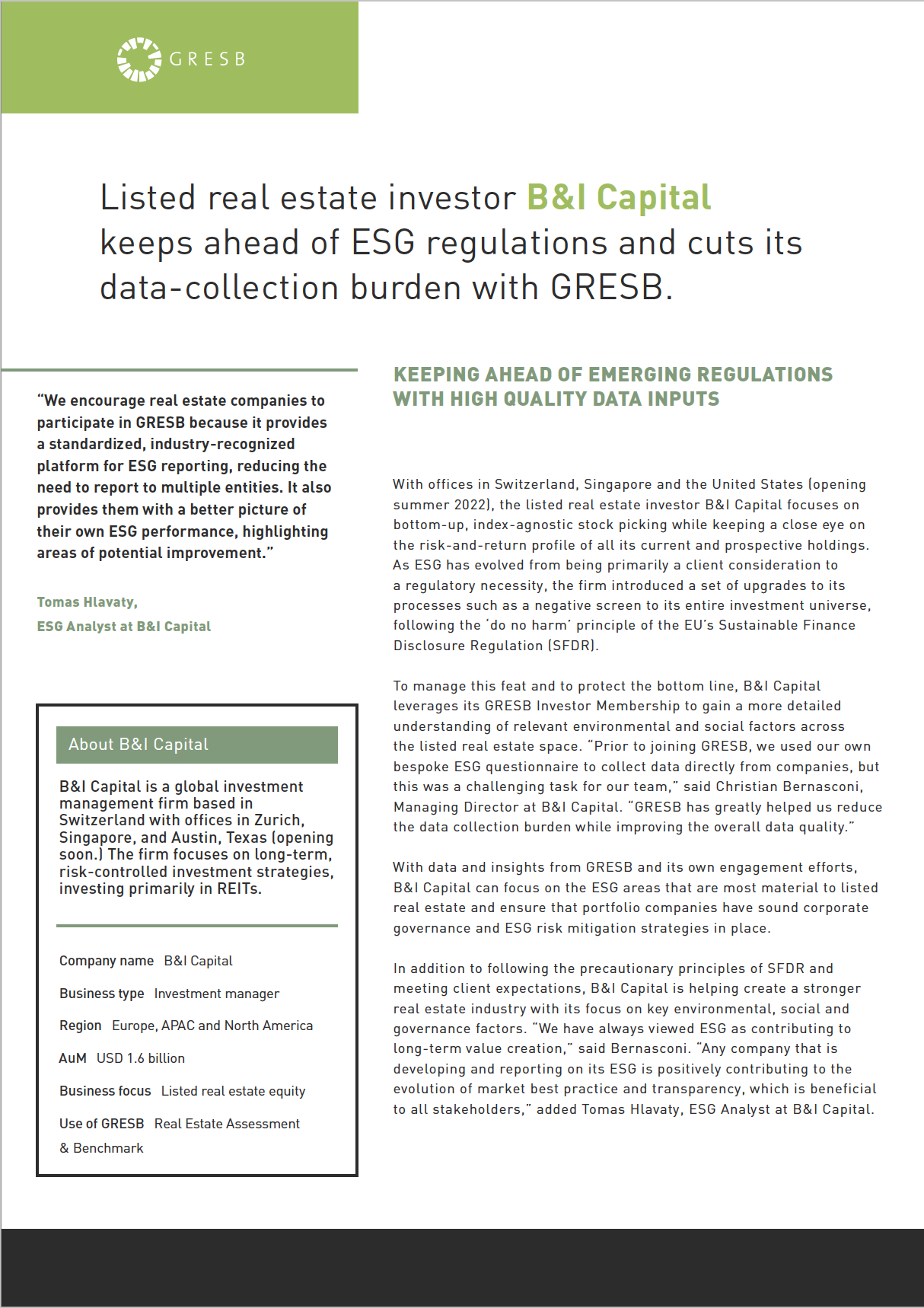Listed real estate investor B&I Capital keeps ahead of ESG regulations and cuts its data-collection burden with GRESB

B&I Capital is a global investment management firm based in Switzerland with offices in Zurich, Singapore, and Austin, Texas (opening soon). The firm focuses on long-term, risk-controlled investment strategies, investing primarily in REITs.
Business type: Investment manager
Region: Europe, APAC and North America
AuM: USD 1.6 billion
Business focus: Listed real estate
Use of GRESB: Real Estate Assessments & Benchmarks
Keeping ahead of emerging regulations with high-quality data inputs
With offices in Switzerland, Singapore, and the United States (opening summer 2022) the listed real estate investor B&I Capital focuses on bottom-up, index-agnostic stock picking while keeping a close eye on the risk-and-return profile of all its current and prospective holdings. As ESG has evolved from being primarily a client consideration to a regulatory necessity, the firm introduced a set of upgrades to its processes such as a negative screen to its entire investment universe, following the ‘do no harm’ principle of the EU’s Sustainable Finance Disclosure Regulation (SFDR).
To manage this feat and to protect the bottom line, B&I Capital leverages its GRESB Investor Membership to gain a more detailed understanding of relevant environmental and social factors across the listed real estate space. “Prior to joining GRESB, we used our own bespoke ESG questionnaire to collect data directly from companies, but this was a challenging task for our team,” said Christian Bernasconi, Managing Director at B&I Capital. “GRESB has greatly helped us reduce the data collection burden while improving the overall data quality.”
With data and insights from GRESB and its own engagement efforts, B&I Capital can focus on the ESG areas that are most material to listed real estate and ensure that portfolio companies have sound corporate governance and ESG risk mitigation strategies in place.
In addition to following the precautionary principles of SFDR and meeting client expectations, B&I Capital is helping create a stronger real estate industry with its focus on key environmental, social, and governance factors. “We have always viewed ESG as contributing to long-term value creation,” said Bernasconi. “Any company that is developing and reporting on its ESG is positively contributing to the evolution of market best practice and transparency, which is beneficial to all stakeholders,” added Tomas Hlavaty, ESG Analyst at B&I Capital.
Clear evidence of sector transformation
Since using GRESB’s listed real estate data and benchmarks, B&I Capital has seen that the sector is becoming more resilient and sustainable over time. The data shows that operators are investing significant amounts in renovations and construction in line with more sustainable practices, increasing the proportion of green-certified assets in their portfolios. The firm is also seeing operators bringing on more robust Environmental Management Systems that are helping manage and decrease their operational environmental footprint in line with their reduction targets.
When it comes to climate risk, having a clear understanding of companies’ overall approach to ESG and their adherence to international standards and initiatives is particularly helpful as the firm implements recommendations from the Task Force on Climate-related Financial Disclosures (TCFD) into its risk management framework.
“We believe that paying attention to all of these factors on a stock level positively impacts the risk profile of our portfolios,” added Bernasconi.
Engaging the wider industry
While B&I Capital uses a variety of tools and strategies to better understand its current and prospective holdings from an ESG perspective, it’s clear that having portfolio companies participate in GRESB is beneficial to both B&I Capital and the companies themselves. Indeed, the firm has joined a collaborative engagement with other investors in the Asia Pacific region to strengthen dialogue on ESG performance and increase participation in the GRESB Benchmark.
“GRESB provides a standardized, industry-recognized platform for ESG reporting, which reduces their need to report to multiple entities,” said Hlavaty. “It also provides them with a better picture of their own ESG performance, highlighting areas of potential improvement.”